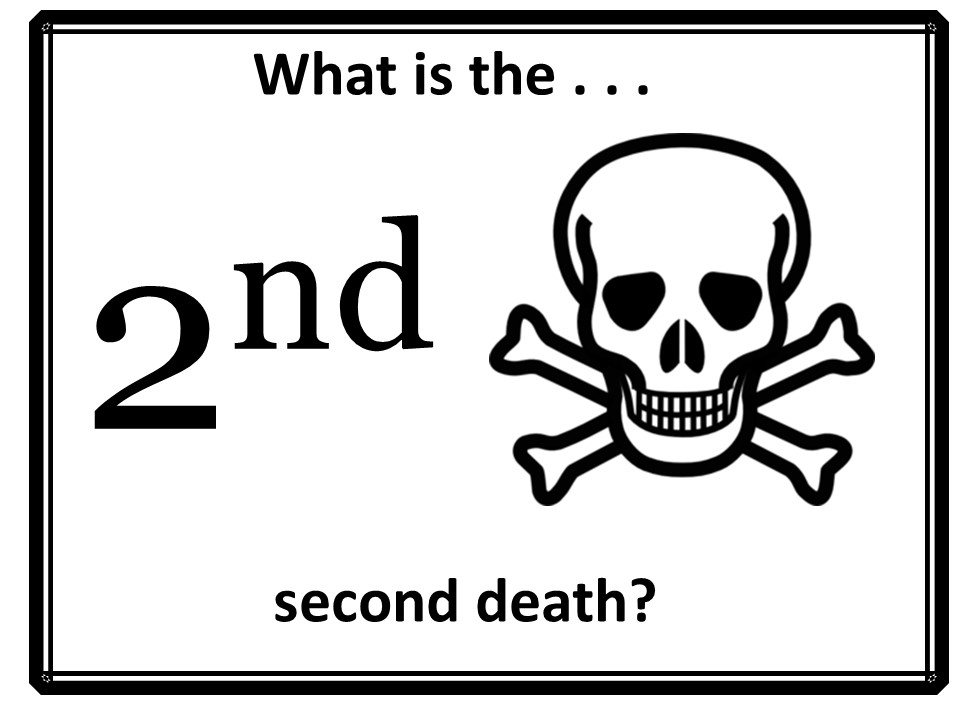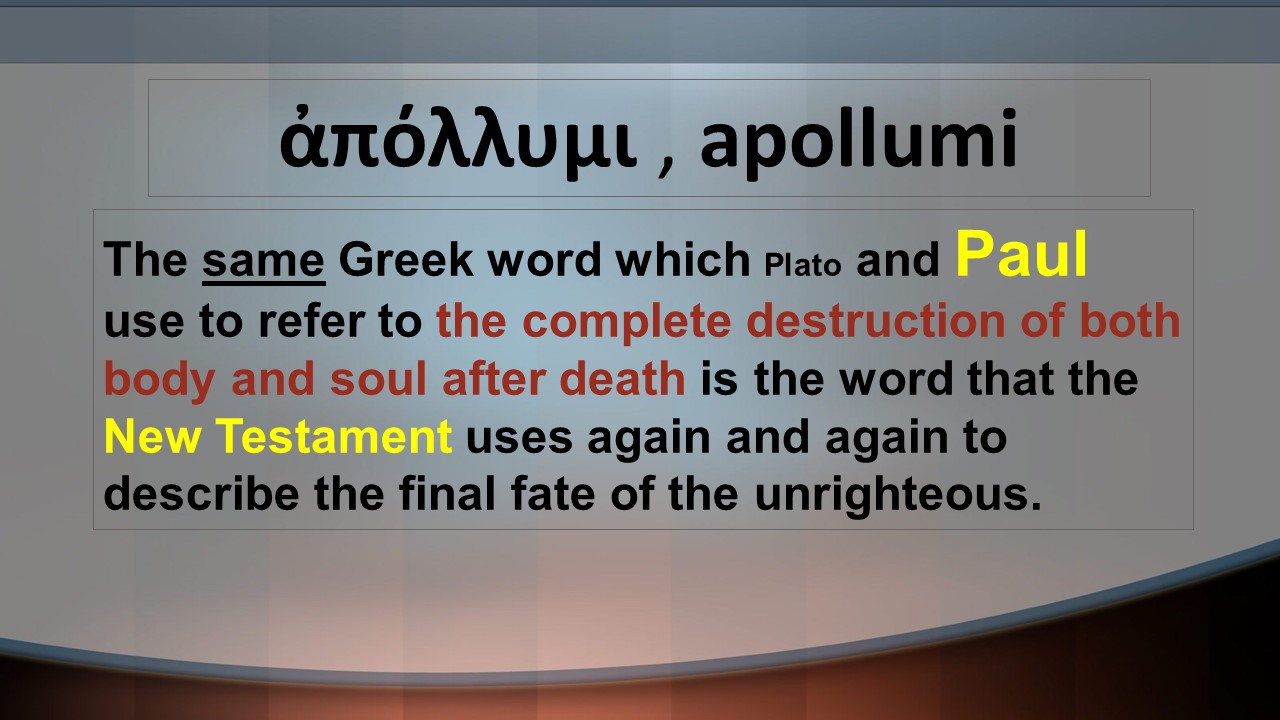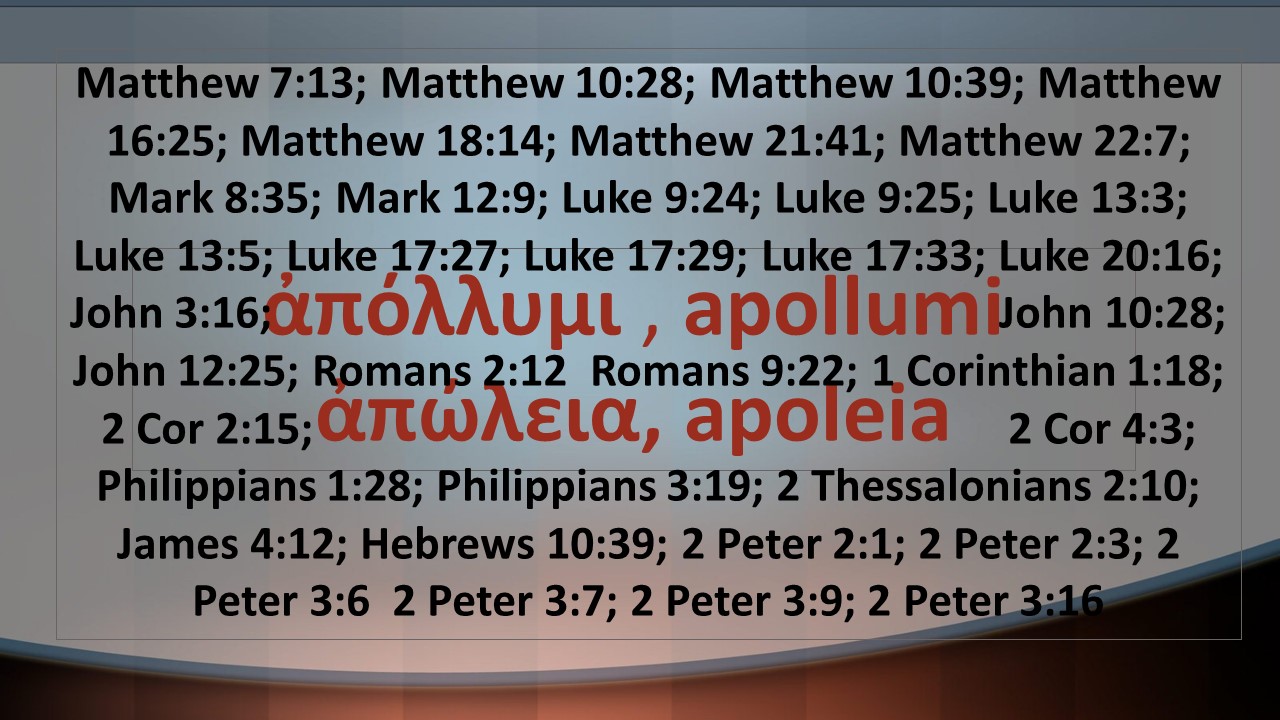Stuart, thanks for asking about this. To answer, I'll copy in an extended quote from
a blog post where I share the results of my word study on destroy/destruction (
apollumi/apoleia):
One Important Word Study
In a great symphony each note played by each instrument contributes to the whole. In the same way, each word of each verse in the Bible harmoniously reveals God’s truth to us.
As I have studied the topic of the eternal fate of the unsaved more and more, I have seen more and more details which all support the truth that unbelievers will eventually utterly perish and be no more. Studies of some of the key words related to this topic have strengthened my confidence in this view.
For me, the most important word study has been the study of the Greek words
apollumi, a verb, and
apoleia, a noun based on the same root. All words have a range of meaning depending on their context. If you wanted to choose a single English verb and noun to translate
apollumi and
apoleia, good choices would probably be “destroy” and “destruction”.
Apollumi/apoleia is probably the word used most often in the New Testament to describe the fate of the unrighteous. In
Matthew 10:28 it is translated “destroy” (also see
Philippians 1:28,
Hebrews 10:39, and
James 4:12), in
Matthew 21:41 it is translated “put . . . to . . . death”, in
John 3:16 and other verses it is translated “perish” (see
Luke 13:3,
5;
Romans 2:12, and
2 Peter 3:9), and in
Philippians 3:19 it is translated “destruction” (see also
Matthew 7:13,
Romans 9:22,
2 Thessalonians 2:3,
2 Peter 3:7,
Revelation 17:11). More examples could be given.
As one who used to believe in eternal conscious torment, and even teach it, I know the usual explanation for verses like
Matthew 10:28 and
John 3:16. It is pointed out that
apollumi can also mean “ruin” (see
Matthew 9:17) or “lost” (
Luke 15:9). That’s true. But this fact fails to recognize that when speaking about people,
apollumi/apoleia very consistently refers to death, usually a violent death. When speaking about inanimate objects like a wineskin or coins, it can indeed simply mean “ruined” or “lost”, but not when speaking about what happens to people, and especially not when speaking about what one person does to another person.
There are in fact quite a few verses where
apollumi is not referring to the eternal fate of people but simply to people killing, or wanting to kill, other people in this world. Here are some examples:
Matthew 2:13 When they had gone, an angel of the Lord appeared to Joseph in a dream. "Get up," he said, "take the child and his mother and escape to Egypt. Stay there until I tell you, for Herod is going to search for the child to kill (apollumi) him."
Matthew 27:20 But the chief priests and the elders persuaded the crowd to ask for Barabbas and to have Jesus executed (apollumi).
Acts 5:37 After him, Judas the Galilean appeared in the days of the census and led a band of people in revolt. He too was killed (apollumi), and all his followers were scattered.
If you want to see more examples, look at:
Matthew 12:14,
Matthew 21:41,
Matthew 22:7, and
Luke 13:33.
While all this information is useful, I found (I was not the first to find this!) even more amazing information about
apollumi/apoleia. You might wonder if the Greeks had a word which was used to refer to the whole person, soul and body, being completely extinguished after death? This is what we mean by “annihilationism”. It turns out they did!
The Greeks had a Word for It!
(Warning: This part is powerful, but a bit technical.)
The Greek philosopher Plato was widely read throughout the Greek speaking world for centuries after he died. In one of his works,
Phaedo, Plato discussed rather extensively his thoughts and opinions about what happens to human souls after death. One of the options he discussed (but did not agree with) was the possibility that a person’s soul would entirely cease to exist, which is what we mean by annihilationism. When he described this possibility he used the word
apollumi:
[from Phaedo, 70a]. They fear that when the soul leaves the body it no longer exists anywhere, and that on the day when the man dies it is destroyed (apollumi) and perishes, and when it leaves the body and departs from it, straightway it flies away and is no longer anywhere, scattering like a breath or smoke.
This is just one example. If you want to research this, you may also find
apollumi used to mean what we mean by “annihilation” in
Phaedo, 80d, 86d, 91d, 95d, and 106b.
In Plato’s
Republic he also uses
apollumi to refer to annihilation of the human soul:
“Have you never perceived,” said I, “that our soul is immortal and never perishes (
apollumi)?” (Republic, 10.608d)
Far more (way more, incredibly more) important than seeing that Plato used
apollumi to mean what I am saying “second death” means, there is a clear example of the Apostle Paul using
apollumi in the same way.
Whatever
apollumi means in
John 3:16, we all agree that it happens after the resurrection and judgment and that it only happens to the unrighteous. But Paul discussed a terrible hypothetical situation where Jesus did not rise from the dead (he did this to show how important the resurrection is to our faith). In this terrible hypothetical situation Paul said that there would be no resurrection for anyone if Jesus did not rise. In this terrible hypothetical situation, Paul explained that even Christians would have
apollumi-ed:
ESV
1 Corinthians 15:18 Then those also who have fallen asleep in Christ have perished (apollumi).
Further, Paul cannot have meant merely that the bodies of Christians were destroyed while their souls suffered for their sin, because Paul goes on to say:
ESV
1 Corinthians 15:32b If the dead are not raised, "Let us eat and drink, for tomorrow we die."
If there is any type of just judgment and punishment after death, it would not make sense to live only for pleasure in this world. So when Paul says that if Christ did not rise from the dead then dead Christians have perished (
apollumi) he is saying exactly what I have been claiming “second death” means, namely the complete destruction of body and soul.
The word Paul uses to describe this “annihilation” is the very same word which the New Testament authors, including Paul, most frequently used to describe the final fate of the unrighteous!
This is truth is worth highlighting:
The word “
appolumi” and it’s noun form, “
apoleia” are often used to refer to the fate of the unrighteous:
Remember, the purpose of this admittedly somewhat technical Greek word study of
apollumi has not been to convince you that the words in your English Bible have some strange, unexpected meaning, but rather to demonstrate that “perish” means “perish” and “destroy” means “destroy”.





